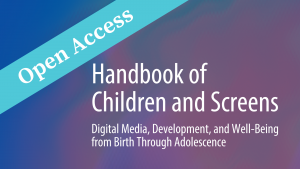
Digital media provide opportunities to create connections, yet not all of these interactions are pleasant. In this section of “Handbook of Children and Screens: Digital Media, Development, and Well-Being from Birth Through Adolescence”, the authors highlight three types of negative engagement that are increasing on social platforms: cyberbullying, digital cruelty, and online hate speech. While these behaviors have existed since the introduction of online platforms, they are becoming more common. The authors note that one explanation for this could be pandemic-related strain and youths’ difficulty coping with it. The rise in digital malice is concerning because these behaviors dramatically impact youth’s mental health, self-esteem, and academic performance. Investing in digital hate research and interventions is, therefore, vital for youth well-being. The authors suggest steps key stakeholders can take to achieve these goals, including developing better measures for defining online hate, conducting longitudinal research, creating evidence-based preventions, and considering school-related interventions.
Recommendations [ALL]
The following recommendations are excerpts from the "Cyberbullying and Digital Cruelty" section of the “Handbook of Children and Screens: Digital Media, Development, and Well-Being from Birth Through Adolescence." This open access publication is free to download in full or by individual chapters via the links provided following the recommendations below.
- Encourage and assist children with developing healthy coping for adverse experiences.
- Provide youth with resources to build resilience.
- Consult key stakeholders when developing provider-based intervention strategies.
- Create a family media plan that addresses responsible digital behaviors and incorporates youth guidance.
- Enhance children’s cybersecurity.
- Develop effective mediation strategies while being mindful of children’s digital rights.
- Talk openly with children about online experiences.
- Support children in developing adaptive coping mechanisms to stressful life events and avoiding digital cruelty.
- Model healthy technology use.
- Raise awareness of the harmful effects of cyberbullying.
- Provide students with morality training and civic engagement opportunities.
- Talk openly with students about their online experiences.
- Create and implement digital literacy programs.
- Seek help from trusted confidants for negative online experiences.
- Seek professional mental health care, if needed.
- Encourage funding of longitudinal studies looking at social media use and impact.
- Consult key stakeholders when developing policies.
- Establish unified definitions of cyberbullying, hate speech, and digital cruelty.
- Routinely update research efforts to address the ever-changing nature of technology and digital cruelty.
- Collect nuanced, objective data on social media use, particularly in non-adolescents.
- Consider macro-level societal influences and international perspectives.
- Explore complex contextual dynamics and predictors of children’s resilience to support intervention efforts.
- Utilize mixed-methods approaches that include both qualitative interviews and case studies alongside quantitative surveys.
- Prioritize interdisciplinary research teams and longitudinal or experimental studies.
Cyberbullying and Digital Cruelty Section Chapters
Introduction to the Section on Cyberbullying and Digital Cruelty
Elizabeth Englander, PhD
Cyberbullying and Social Media
Robin Kowalski, PhD, Gary W. Giumetti, PhD, Justin Patchin, PhD, Shelia Cotton, PhD, Wendy Craig, PhD
Digital Cruelty’s Impact on Self-Esteem and Body Image
Kaitlynn Burnell, PhD, Jolien Trekels, PhD, Madeline J. George, PhD, Jacqueline Nesi, PhD
Criminological, Psychological, and Developmental Aspects of Pandemic Strain and Online Cruelty
Katalin Parti, PhD, Cheryl E. Sanders, PhD, Rosanna Breaux, PhD, Meghan McCoy, EdD
Online Hate Speech Among Adolescents: Theory, Research, and Recommendations
Sebastian Wachs, DPhil, Angela Mazzone, PhD, Anja Schultze-Krumbholz, DPhil, Michelle F. Wright, PhD, Nicola Döring, DPhil, Dorothy L. Espelage, PhD, Manuel Gámez-Guadix, PhD, Jun Sung Hong, PhD





